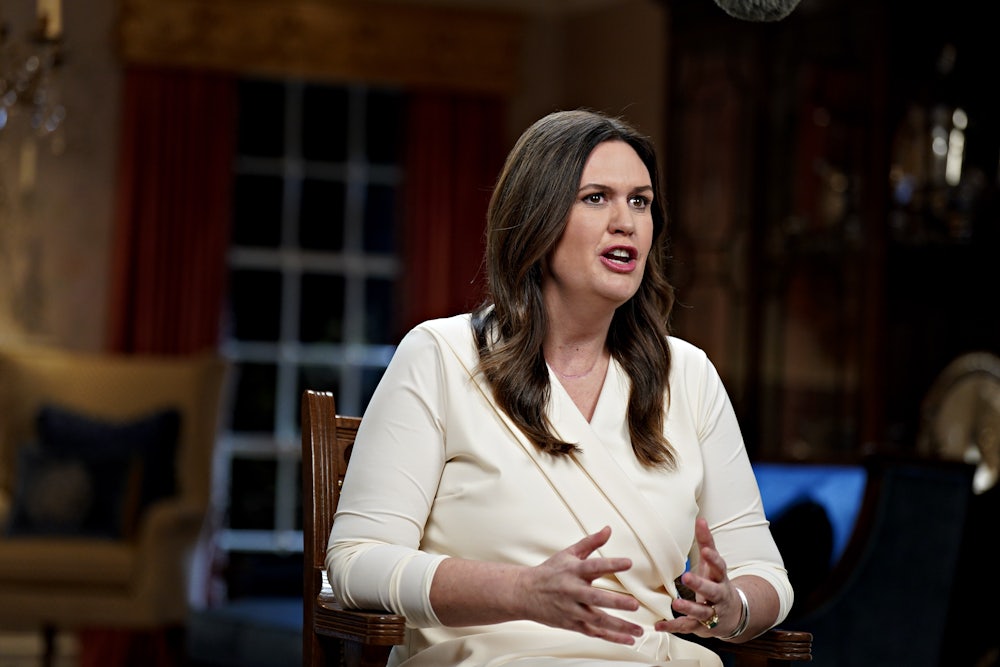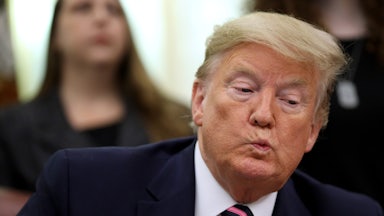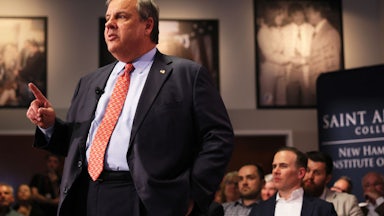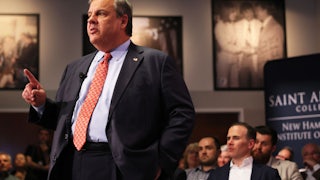Sarah Huckabee Sanders stood behind a lectern, smiling broadly. It was not an unfamiliar stance for the former White House press secretary: Sanders had presided over press briefings for nearly two years during the Trump administration, appraising reporters with an arched eyebrow and terse response from her podium.
This particular lectern, however, was adorned with the state of Arkansas’s seal. On a bright morning in early January, Sanders took the oath of office to become the state’s governor—the same position her father, Mike Huckabee, held for 11 years in the 1990s and early 2000s—addressing the cheering crowd from the steps of the state Capitol. Her demeanor was looser and more triumphant than it had been at the White House, where Sanders had frequently scolded reporters, once snapping at a correspondent that he could not understand “short sentences.”
“We made it,” she said with a grin, shaking her fist in the air. But to say Sanders simply “made it” is an understatement: She won her race by 30 percentage points, quickly solidifying control of state government with executive orders and rapid passage of her major legislative priorities, aided by eager Republican supermajorities in the state legislature.
Establishment Republicans and the political commentariat have been wringing their hands over who could possibly lead the party after Donald Trump, wishcasting into the void for a successor capable of appealing to his base. Sanders may be a viable contender to step into that vacuum, as her prominent knack for partisan warfare, and early legislative successes have cemented her as the Republican governor to watch in the not-quite-post-Trump era.
It would be easy to write off Sanders as another political “nepo baby,” someone with the right name at the right time. But that would overlook her political skills. “[She’s] a governor who is grounded in who she is, what she believes, and going after it day one. And she’s not slowing down,” said Chip Saltsman, a Republican operative who worked on Huckabee’s presidential campaign and Sanders’s gubernatorial bid.
Sanders’s response to President Joe Biden’s State of the Union address in February, an unusual honor for a first-term governor less than a month on the job, highlighted her quick ascent to standard-bearer of the Republican ideology. “The dividing line in America is no longer between right and left—it’s between normal or crazy,” Sanders said. She intoned a laundry list of early accomplishments, like her executive orders banning the teaching of critical race theory in schools and the use of the term “Latinx” in official documents.
As the legislative session began in earnest, Sanders quickly bent the state government to her will. She signed sweeping legislation which overhauled the state’s education system, as well as a bill making it easier to employ children, rolling back requirements for the state to verify ages of workers under 16. The legislature also passed a law allowing an anti-abortion monument to be built near the state Capitol.
But her governorship has perhaps garnered the most national attention for its legislation targeting transgender students. The legislature passed a law making it easier to bring malpractice suits against doctors who provide gender-affirming care for minors; a bill barring transgender individuals from using school restrooms that align with their gender identity; and a measure requiring parental approval for teachers to address transgender students by their preferred names and pronouns. Sanders even sells koozies on her campaign website that celebrate herself and other female Republican governors as “real women,” jabbing at a beer ad that highlighted a transgender influencer.
“It was the worst legislative session in my memory,” said Rex Nelson, a Republican columnist who served in the Huckabee administration and has been one of Sanders’s sharpest critics since she took office. “They’re taking right-wing national blueprints on things and tacking them on to Arkansas.”
Indeed, Sanders, a summa cum laude graduate of the Donald Trump School of Combative Communications, understands the issues which motivate GOP voters, tossing red meat to her political base—a bite of “anti-woke” rhetoric here, a morsel of transgender discrimination there—and arming herself for culture-war battles with own-the-libs bluster and branded koozies. Sanders’s name has even been bandied about as a potential vice-presidential pick for the eventual 2024 Republican nominee, particularly if it is her former boss, Trump.
For the time being, however, Sanders appears focused on polishing Arkansas into a mirror reflecting her own values—and by extension, those of a Trumpian Republican Party—bolstered by her faith, and her seemingly bottomless reserves of statewide political influence.
“You and I were put on this Earth at this very moment to charge boldly ahead,” Sanders told the assembled crowd of Arkansans in her inaugural address in January, her face illuminated by the cold light of the winter sun. “With God as our witness, we will show the world that there is still a place in America where freedom reigns, and liberty will never die. And that place is Arkansas.”
Sanders was confident and self-assured from a young age. She and her two older brothers belonged to an elite fraternity of children, given their father’s dual roles as a Baptist minister and elected official. Preacher’s kids—often called PKs—represent their parents, growing up under not only their family’s but also a congregation’s watchful eyes.
It is thus not surprising that Sanders—who once recounted stuffing envelopes, knocking on doors, and erecting yard signs as a nine-year-old during her father’s unsuccessful 1992 campaign for Senate—arrived at the governor’s mansion already bearing the poise befitting a pastor’s daughter. She joined the Little Rock Central High School’s debate team, acquitting herself with humility at a school in a relatively liberal enclave of the state.
“If I had a kid who was coming to a new city and a new school, and in those circumstances, I would hope that they would behave like Sarah did at the time,” said Clarke Tucker, who was on the debate team with Sanders and is now a Democratic state senator. Chris Wheat, another former classmate on the debate team, said that “if someone hadn’t told me she was the daughter of the governor, I doubt I would have ever known.”
Sanders attended her father’s alma mater, Ouachita Baptist University. She further engaged with politics, joining student government and successfully suing the county to prevent officials from suppressing student votes. Hal Bass, a political science professor at Ouachita who taught Sanders in multiple classes, recalled her as friendly and humble, with a talent for “critical reflection.” She was confident in her faith and her beliefs but approached both with nuance: “She was interested in exploring [and] looking into conservative thought,” Bass recalled. “It wasn’t just some sort of reflexive, ‘This is my tribe.’”
Sanders was still in her mid-twenties when she joined her father’s presidential campaign, all but moving to Iowa in the final months of 2007 to prepare for the caucuses. She quickly won over Saltsman, Huckabee’s campaign manager, who had been skeptical of hiring the boss’s daughter. She was “incredibly committed,” Saltsman said, staying with the campaign staff in Iowa over Christmas rather than going home to be with her family. “She was just a loyal staffer, a loyal friend to everybody on staff, and she never pulled rank when clearly she could,” said Saltsman, who has remained close to Sanders, and is the godfather to her daughter. (Sanders met her husband, political strategist Bryan Sanders, in Iowa.)
Two years later, when John Boozman needed a campaign manager for his Senate bid, he chose 27-year-old Sanders, impressed by her Arkansas knowledge and her experience shepherding a successful field operation in Iowa: Huckabee won the Iowa caucuses in 2008, the pinnacle of his bid for president. A former University of Arkansas football player, Boozman called Sanders a “great coach.” “She worked me very, very hard. Harder than I wanted to work,” he said.
The coaching paid off: Boozman defeated seven other Republican primary candidates, then trounced incumbent Democratic Senator Blanche Lincoln in the general election. Janine Parry, a political science professor at the University of Arkansas, sees Boozman’s election as a harbinger of Arkansas’s rapid rightward shift, but also credits Sanders’s skill as a campaign manager. “For her to pull that off on his behalf—he certainly had some name recognition, but it’s not like he was a long-term incumbent,” Parry said.
Her credentials solidified, Sanders managed Tim Pawlenty’s unsuccessful 2012 presidential bid and advised Senator Tom Cotton’s victorious 2014 campaign back home in Arkansas. She briefly led her father’s ill-fated second presidential crusade in 2015, then joined the Trump team the following year. By the time she became principal deputy press secretary in the Trump administration, Sanders was well-versed in defending the new president.
She had once helped Saltsman “speak Huckabee,” interpreting for a folksy GOP governor who confounded reporters and excited Republican voters. Ten years later, her skill in interpreting the words of another politician who charmed the base while enraging moderates—and her belief that the approval of those supporters was more important than that of the media—came in handy at the White House, as she facilitated communications strategy for an administration that disdained the media while feeding off its censure.
“Sarah’s somebody who benefits enormously from contrasts,” one longtime White House reporter told me. “Was she an awful press secretary, comfortable with lying from behind the podium? Absolutely. Was she as bad as Kayleigh McEnany [Trump’s final press secretary]? Was she as bad as Sean Spicer? No.”
Sanders succeeded Spicer, the bombastic, blustering first press secretary in the Trump White House, in the summer of 2017. She served in that position for two years, a significant tenure in Trumpworld. Perhaps more unusually, she maintained a strong relationship with Trump, leaving the administration on her own terms. Sanders “was someone that the president could count on,” Spicer told me, because she could communicate Trump’s policies and ideas “to his satisfaction.”
That often came at the expense of the truth. Sanders defended some of Trump’s more egregious falsehoods and refused to refute his comments that the press was the “enemy of the people.” But she could be helpful when the camera was off, the White House reporter recalled, saying that Sanders “shared a lot more information if you caught her by herself in her office.” She gained national prominence at the White House, but political notoriety can be a double-edged sword: Republicans learned her name, and so did Democrats and swing voters.
Allies say that her administration role prepared her for the governorship. “The pressure cooker of the White House certainly cannot be overstated, and cannot be duplicated anywhere,” said Hogan Gidley, another Trump White House staffer who previously worked for Huckabee. “And Sarah is so good at compartmentalizing the rigors and the demands of that job with the pressing needs of a family.”
Working in the administration was hardly a prescription for ongoing professional success, with the president discarding previous loyalty over perceived slights. Just ask former Attorney General Jeff Sessions, former Communications Director Anthony Scaramucci, and former Chief of Staff John Kelly, for example, all of whom ended their administration stints in ignominious termination. But Sanders left the White House with her strong relationship with the president intact. Speaking at a White House event before her June 2019 departure, Trump praised her as “tough and good.” “Folks, if we can get her to run for the governor of Arkansas, I think she’ll do very well,” Trump said. “And I’m trying to get her to do that.”
Sanders followed her former boss’s advice, launching her gubernatorial campaign in January 2021, easily dominating the Republican primary field and essentially forcing the two top contenders, then–Lieutenant Governor Tim Griffin and then–Attorney General Leslie Rutledge, to drop their bids. (The two have since switched roles: Griffin is the state attorney general, and Rutledge the lieutenant governor.)
Republican State Senator Missy Irvin argued to me that “the main reason she won so big is because she’s an Arkansas girl.” “She’s a mom, she’s a wife, she’s a friend, she’s a sister, a daughter, a neighbor, she’s the chick you can play flag football with,” Irvin said.
But while some see her as the same Sarah Huckabee Sanders they’ve known for decades, Nelson, the conservative columnist, is dismayed by the changes the Trump administration wrought in her. “It’s like having a family member join a cult. You can’t get them out,” Nelson said, adding that her time working for Trump, as well as Trump’s continued support for her, was “key” to her election. Indeed, Sanders’s campaign more befitted a national than a statewide race: “You bet I am,” she told supporters in 2021 about nationalizing the election, “because if you’re not paying attention to what is happening in this country, you’re missing what is going on.”
It’s hard to deny that her family name and the Trump factor gave Sanders “not just a leg up, but two legs up,” as Saltsman, who led her gubernatorial campaign, put it. But Sanders “attacked it,” wanting to earn the post rather than coast to victory (as she easily could have). Sanders “was pushing us,” Saltsman recalled—echoes of the drive she displayed in the 2010 Boozman campaign.
In Arkansas, Sanders cuts a figure able to bridge her father’s traditional Republican Party and her old boss’s modern redux. She can “wade in both of those pools,” said Roby Brock, the editor-in-chief of Arkansas Talk Business & Politics, and a longtime state commentator. “She’s got the respect of a lot of the more conservative and the more populist Republicans,” he said. “It’s an unusual balance to be able to strike [for] Republican elected officials. I think that’s one of the secret ingredients to her success.”
Although the Republicans who love her in Arkansas far outweigh the Democrats who don’t, the characteristics which make her so popular in the Natural State—from her unapologetic championing of right-wing priorities to her Trump ties—could alienate a larger audience. Sanders is a polarizing figure nationally, as many still remember her dissembling for Trump from the White House podium. A vice presidential nominee Sarah Huckabee Sanders, with her proud Trump ties and culture-war fervor, might energize the GOP faithful, but could well turn off crucial swing state voters. But this is, in a nutshell, a major problem plaguing the Republican Party: a need to please the base to the exclusion of everyone else.
Then again, perhaps her credentials as a youngish, white, suburban mom would appeal to other youngish, white, suburban moms, granting her persona as governor a sum that is greater than her parts as Trump’s mouthpiece and relentless culture warrior. (Sanders reportedly declined to endorse Trump in 2024, a report which Trump denied in a Truth Social post also claiming credit for her political rise.)
This may not be Sanders’s year, but she’s barely 40—just under half the age of the current president, and 36 years younger than the previous one—with plenty of time to continue building her national persona and reshaping her corner of the country in her image.
“Sanders has now had this extraordinarily successful first session, from her perspective, that at the same time has been extraordinarily successful in terms of ramping up for whatever is next for her,” said Parry, the political science professor at the University of Arkansas. “And it’s clear it’s going to come sooner rather than later.”






